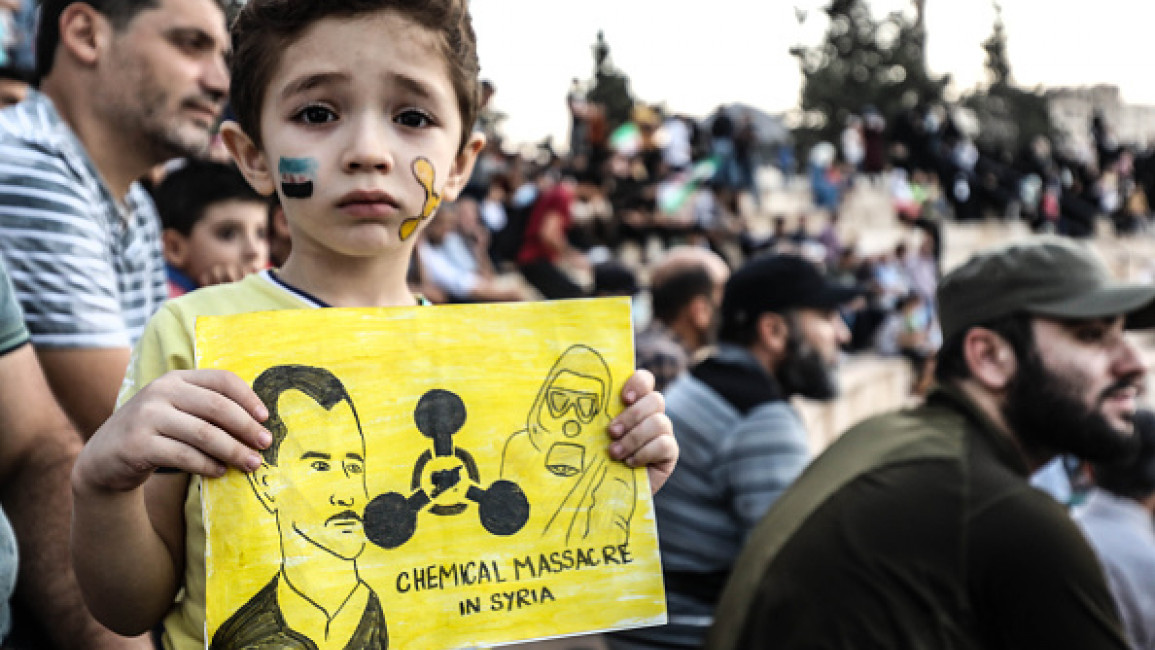Remembering Syria's Ghouta chemical weapons massacre 10 years on
Monday, 21 August will mark ten years since the Ghouta chemical massacre, when the regime of Bashar al-Assad released the nerve agent sarin on Syrian civilians in the then rebel-held Ghouta district of Damascus, killing more than 1,400 people – many of them children.
The New Arab looks back at this crime on the eve of a decade since its tragic occurrence.
Syrian revolution in Ghouta
From the very earliest days of the Syrian revolution in 2011, the population of East Ghouta had been overwhelmingly supportive of the Syrian revolutionary cause and the consequent armed rebellion against the Assad regime and its allies.
By 2013, Ghouta was held by rebel forces and the Assad regime had imposed a brutal siege on the district, collectively punishing the civilians living there. The regime also routinely bombarded the area with airstrikes and artillery fire, often killing many civilians.
The ‘silent’ massacre
In the early hours of 21 August, the residents of Ghouta were alerted to what was by then a very typical air raid. However, witnesses say that while air raids are usually accompanied by the sounds of missiles and the resultant explosions, no noise accompanied this particular one.
A few hours later, Ghouta’s medical facilities were overwhelmed by hundreds of patients being brought in with no visible signs of injury, which were the types of conflict and trauma injuries the health workers had been used to. Rather, these patients were experiencing convulsions, suffocation, coughing up blood, foaming at the mouth, and, ultimately, death.
As one report put it, patients, particularly children, were "dropping like flies" in front of perplexed medical staff.
It would later be confirmed by experts that these people has been suffering from the cruel effects of sarin gas, which had been deliberately fired into civilian areas in Ghouta by Assad regime forces.
The world awoke to countless pictures and videos of piles of dead bodies being held in makeshift morgues set up to deal with the unprecedented influx of corpses over a period of less than 24 hours.
In the hours that followed, not only did Ghouta struggle to cope with the dead and affected victims, but also the fear of another attack.
As Nour Aden, an activist who survived Ghouta recounted: "You hear the planes come and you fear the bombing. But the chemicals are silent. You don’t know you’re dying until you can smell it and then it is too late."
Global outrage, business as usual
In the aftermath of the attack, there was widespread global outrage and horror at the scenes emerging from Ghouta. The US had claimed that chemical weapons use was a 'red line' that if crossed would prompt its intervention in the Syrian war to protect civilians.
But the Obama administration quickly abandoned the idea.
What emerged instead was a US-Russian deal, called the Kerry-Lavrov agreement, that allegedly facilitated the removal of Syria’s chemical weapons stockpiles under UN supervision.
Russia had instantly claimed against the overwhelming contrary evidence that Assad was innocent of the Ghouta attack, instead using its vast disinformation network to blame the victims or claims it was a 'false flag'.
Critics said it allowed Assad to get rid of one particularly cruel aspect of his arsenal, while allowing his conventional slaughter to continue. However, it didn’t even negate the use of chemical weapons by Damascus. Along with many minor attacks, the Assad regime would go on to commit two more major chemical weapons attacks at Khan Sheikhoun in 2017 and Douma in 2018, which prompted minor US-led airstrikes on Assad's chemical facilities.
Remembering the victims and survivors
Every year since the attack, Syrian activist groups have gathered around the world in remembrance of the massacre and to highlight the continued plight of Syrians who oppose Assad, Iran and Russia.
This year, The Syria Campaign organised events over the weekend in cities around the world to remember Ghouta and its victims and give voice to its survivors as its tenth anniversary approaches.
We are gathered today in #Berlin with Syrian survivors, activists, artists and musicians to honour and pay tribute to those who were killed by the Syrian regime in the #Ghouta chemical weapons massacre ten years ago and to demand justice in their name. @ActForGhouta pic.twitter.com/xVEFXpgGaJ
— The Syria Campaign (@TheSyriaCmpgn) August 19, 2023
The fundamental grievance for Syrians is that there has been no justice for the estimated 1,400 dead and Assad continues to get away with other crimes.
As the Syria Civil Defence, popularly known as the White Helmets, put it: "A decade has passed since the chemical weapons massacre in Ghouta – a wound that remains unhealed, as souls still await justice."


![Minnesota Tim Walz is working to court Muslim voters. [Getty]](/sites/default/files/styles/image_684x385/public/2169747529.jpeg?h=a5f2f23a&itok=b63Wif2V)




![Debris near Rafic Hariri International Airport [Getty]](/sites/default/files/styles/image_212x120/public/2176162423.jpeg?h=a5f2f23a&itok=XLiO6WHk)
![An Israeli air strike on Jabalia killed teenage journalist Hassan Hamad [Screengrab/X]](/sites/default/files/styles/image_212x120/public/2024-10/hassan%20hamad1.jpg?h=c12e0b96&itok=KstD_5xk)
